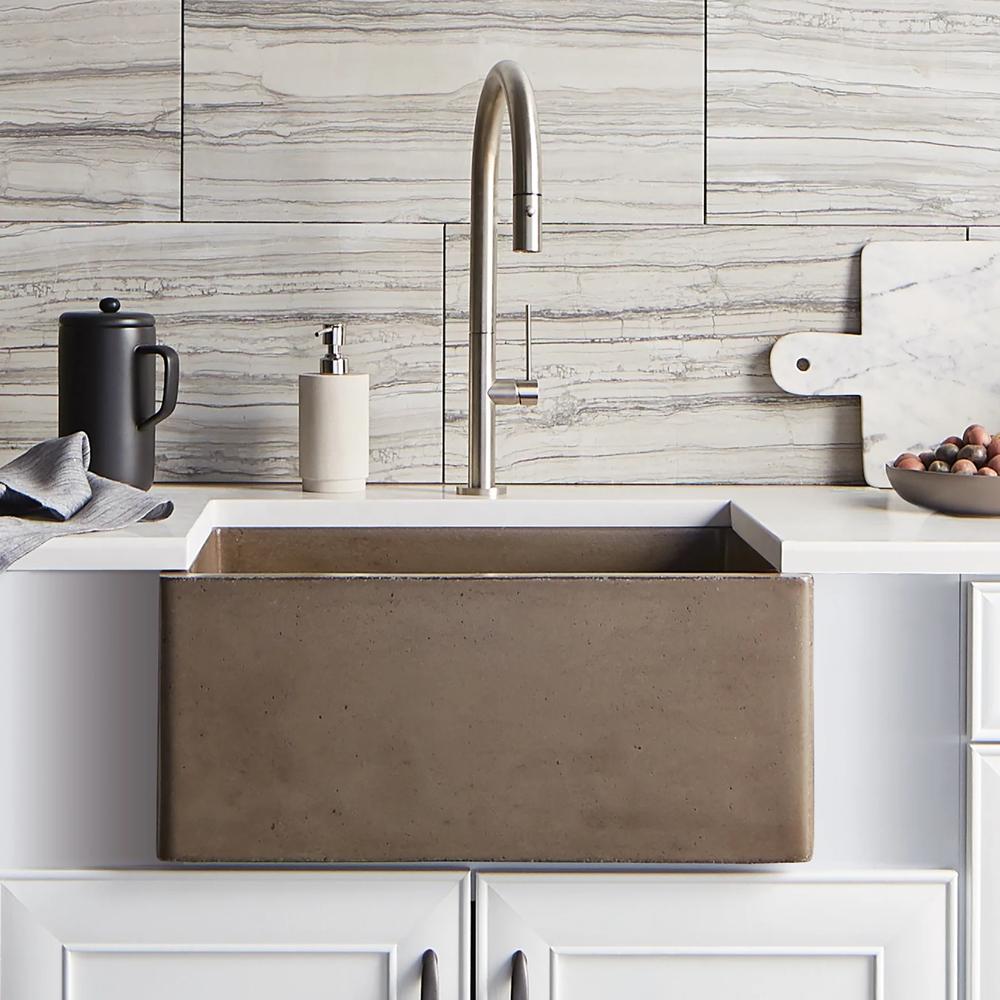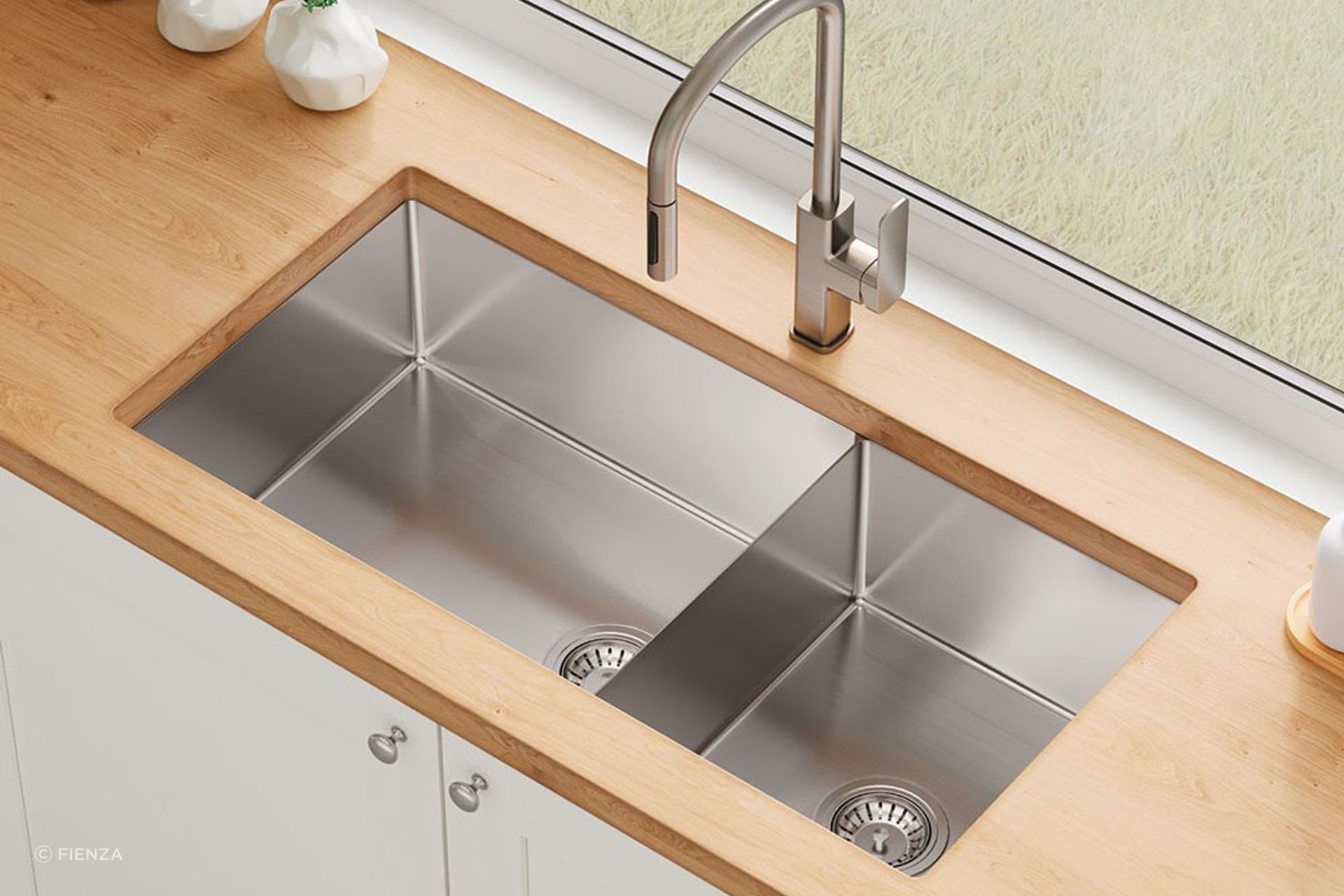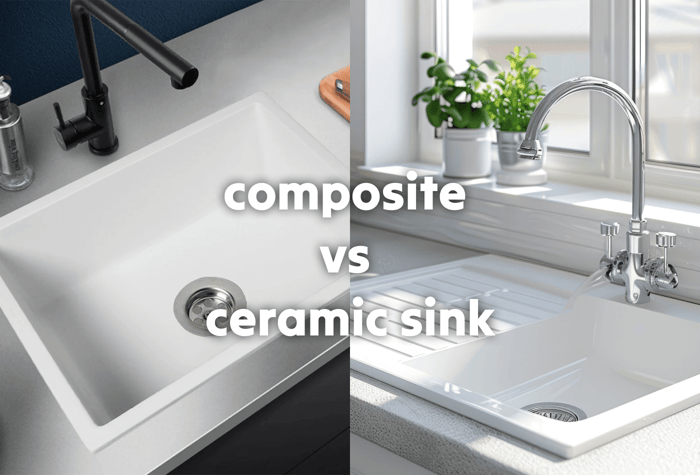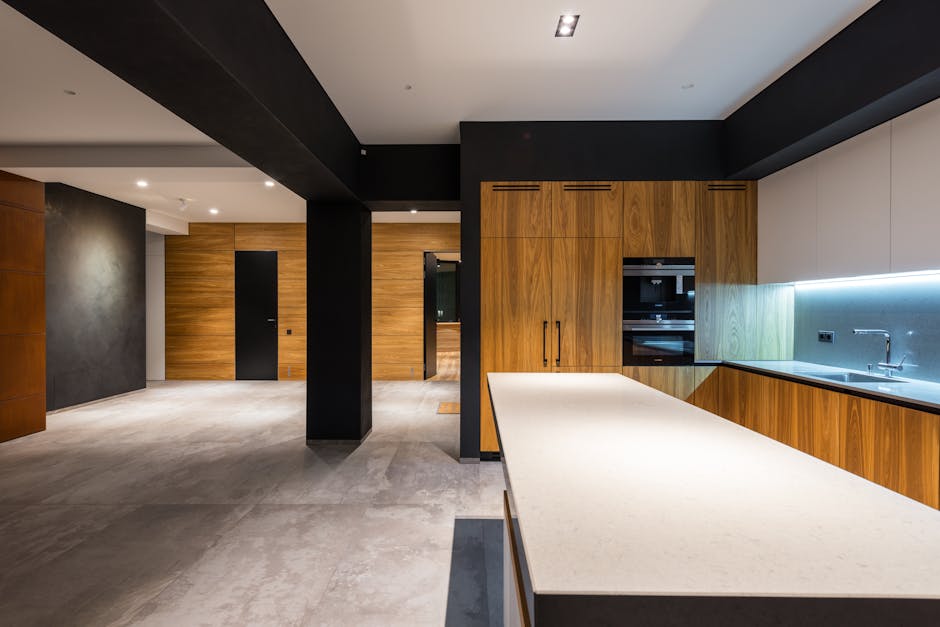Choosing the best material for your kitchen sink might seem simple, but it can change how your kitchen looks and works every day. You want something that lasts, looks great, and fits your lifestyle.
Imagine a sink that stays shiny, resists stains, and handles all your cooking messes without a fuss. You’ll discover which materials stand out and why they might be the perfect match for your kitchen. Keep reading to find the ideal sink material that suits your needs and makes your kitchen a place you love.
Popular Kitchen Sink Materials
Choosing the right material for your kitchen sink can transform your culinary workspace from ordinary to extraordinary. From durability to aesthetics, each material offers unique benefits that cater to different needs and preferences. Let’s dive into some popular kitchen sink materials to help you make an informed decision.
Stainless Steel
Stainless steel sinks are incredibly popular due to their resilience and modern look. They are resistant to rust and stains, making them a low-maintenance choice. Plus, they can complement any kitchen style, from traditional to contemporary. If you enjoy a quiet kitchen, consider sinks with sound-absorbing pads.
Cast Iron
Cast iron sinks coated with enamel are known for their durability and classic appeal. They resist scratches and dents, but keep in mind they can be heavy. You might need sturdy cabinets for support. Their glossy finish can add a touch of elegance, but be careful with heavy pots to avoid chipping.
Composite Granite
Composite granite sinks offer the natural beauty of stone without the high price tag. They’re scratch and stain-resistant, making them ideal for busy kitchens. Available in various colors, they can complement any design scheme. However, they require regular cleaning to prevent water spots.
Fireclay
Fireclay sinks are crafted from clay and glaze, resulting in a hard, non-porous surface. They are known for their timeless look and durability. While they can withstand high temperatures, they may chip if heavy items are dropped on them. Their smooth surface makes them easy to clean.
Copper
Copper sinks are perfect for adding a warm, rustic charm to your kitchen. Over time, they develop a unique patina that adds character. Copper is naturally antimicrobial, which can help keep your kitchen hygienic. However, they require regular maintenance to preserve their finish.
Acrylic And Resin
Acrylic and resin sinks are lightweight and versatile, available in various shapes and colors. They offer a budget-friendly option that is easy to install. Although they resist stains, they can be prone to scratching. Consider using a sink mat for added protection.
Which material resonates with your lifestyle and kitchen vision? Each option has its unique advantages, so weigh them carefully before choosing the one that fits your needs best.

Credit: thesinkboutique.com
Durability And Maintenance
Durability and maintenance are key factors when choosing the best material for your kitchen sink. Your sink faces daily wear and tear, so it should stand up to scratches, stains, and heat. At the same time, it should be easy to clean and maintain, saving you time and effort in the long run.
Scratch And Stain Resistance
Stainless steel sinks are popular because they resist stains and handle scratches fairly well. However, thinner steel can show scratches more easily over time. On the other hand, granite composite sinks are excellent at hiding scratches and resisting stains due to their dense surface.
Porcelain sinks look beautiful but tend to chip or stain if not cared for properly. If you want a sink that stays looking new with minimal worry, consider quartz or solid surface materials, which offer strong resistance to both scratches and stains.
Heat Tolerance
Heat tolerance matters if you often place hot pots or pans in your sink. Stainless steel sinks handle high temperatures without damage, making them practical for busy kitchens. Granite composite also withstands heat well, but extreme temperature changes can sometimes cause cracks.
Porcelain sinks can crack under sudden temperature shifts, so avoid placing very hot items directly in them. Solid surface sinks have moderate heat resistance but can warp if exposed to very high temperatures for a long time.
Cleaning Tips For Each Material
- Stainless Steel:Use mild dish soap and a soft cloth to clean daily. Avoid abrasive cleaners to prevent dulling the finish. For tough stains, a paste of baking soda and water works wonders.
- Granite Composite:Clean with warm water and a non-abrasive sponge. Avoid bleach or harsh chemicals that can damage the surface. Wipe dry after cleaning to prevent water spots.
- Porcelain:Use non-abrasive cleaners and a soft brush. For stubborn stains, try a mixture of vinegar and baking soda. Be gentle to avoid chipping the surface.
- Solid Surface:Clean with mild soap and water. Avoid sharp objects and abrasive pads to maintain the smooth finish. Small scratches can often be buffed out with fine sandpaper.
Aesthetic Appeal
The aesthetic appeal of your kitchen sink plays a crucial role in defining the overall look and feel of your kitchen. It’s not just about functionality; your sink should complement your kitchen’s design and express your personal style. Choosing the right material influences color, finish, and how the sink will age over time.
Color And Finish Options
Different sink materials offer a wide range of color and finish choices. Stainless steel sinks often come with a sleek, shiny finish that fits modern kitchens but can also have brushed or matte options for a softer look.
Composite granite sinks provide rich, earthy tones like black, gray, and beige, adding warmth and depth. Porcelain and fireclay sinks usually feature glossy white or pastel shades, offering a classic, clean appearance.
Think about how these colors will interact with your countertops and cabinets. Would a bold black sink create a striking contrast, or would a subtle matte finish blend better with your kitchen’s palette?
Matching Kitchen Styles
Your sink material should align with your kitchen’s style to create harmony. A stainless steel sink works well in contemporary or industrial kitchens, emphasizing clean lines and minimalism.
For farmhouse or traditional kitchens, fireclay or porcelain sinks with their soft curves and smooth surfaces fit perfectly. Composite sinks suit rustic or transitional kitchens because of their natural look and durability.
Ask yourself: Does your sink enhance the theme, or does it feel out of place? The right match can make your kitchen feel more inviting and thoughtfully designed.
Aging And Patina Effects
Consider how your sink material will age over time, as this affects its long-term appearance. Stainless steel develops a unique patina and fine scratches that can add character but may also require regular polishing to maintain its shine.
Cast iron sinks with enamel coating can chip or discolor but often gain a charming vintage look. Composite sinks tend to resist staining and maintain their color, making them look newer for longer.
How do you feel about a sink that changes and gains personality, versus one that stays consistently polished? Your choice here impacts not just aesthetics but also maintenance.

Credit: archipro.com.au
Cost Considerations
Considering the cost is crucial when choosing the best material for your kitchen sink. It’s not just about the price tag on the product but the overall expenses that come with installation and maintenance. Understanding these cost factors helps you make a smart investment that fits your budget and lifestyle.
Initial Purchase Price
The initial cost varies widely depending on the sink material. Stainless steel sinks are often the most affordable, with prices starting as low as $100. On the other hand, materials like granite composite or fireclay can cost several hundred dollars or more.
Think about your budget upfront. Would you prefer to spend less now and possibly replace the sink sooner, or invest more initially for durability? This choice impacts your kitchen’s look and your wallet immediately.
Installation Expenses
Some sink materials demand more complex installation, which can increase your total cost. For example, heavy materials like cast iron or granite require professional installation and sturdy support, raising labor charges.
In contrast, lightweight stainless steel or acrylic sinks often allow for easier, less costly setups. Have you checked if your current countertop can support a heavier sink? Ignoring this can lead to unexpected expenses.
Long-term Value
Think beyond the upfront costs. Durable materials like fireclay or stainless steel can last decades without needing replacement. This longevity can save you money over time despite higher initial prices.
Also, consider maintenance costs. Some sinks resist stains and scratches better, meaning fewer repairs and less frequent cleaning products. What’s more important to you: paying less now or saving more in the long run?
Environmental Impact
Choosing the best material for your kitchen sink goes beyond just looks and durability. The environmental impact of your choice can influence resource use, waste production, and even your home’s carbon footprint. Understanding how different materials affect the planet helps you make a decision that aligns with your values and contributes to a healthier environment.
Sustainability Of Materials
Some sink materials require more energy and resources to produce than others. Stainless steel, for example, is made from abundant natural resources and often contains recycled content, making it a more sustainable option. On the other hand, composite sinks made from granite or quartz often involve mining, which can damage ecosystems.
Think about how long your sink will last too. A durable material means fewer replacements, which reduces waste and resource use over time. Have you ever considered how a short-lived product might add to landfill problems?
Recyclability
Recycling plays a key role in reducing environmental impact. Stainless steel sinks are highly recyclable and can be melted down and reused without losing quality. This means when you upgrade your sink, the old one won’t just become trash.
Materials like cast iron are also recyclable but might require more energy to process. Meanwhile, composite sinks often can’t be recycled easily, which means they typically end up in landfills. Is your current sink material something you can recycle or repurpose?
Eco-friendly Alternatives
If you want to minimize your kitchen’s footprint, consider eco-friendly sink options such as recycled copper or bamboo composite sinks. These materials use less energy to produce and often come from renewable sources.
Another alternative is sinks made from recycled glass. They not only look unique but also help reduce waste by giving discarded glass a new life. Would you try a sink that combines style with sustainability?
Choosing The Right Sink For Your Needs
Choosing the right kitchen sink goes beyond just picking a stylish design. It means matching the sink material and size to how you use your kitchen daily. Understanding your lifestyle and kitchen setup helps you select a sink that performs well and lasts long.
Lifestyle And Usage Patterns
Think about how often you use your kitchen and what tasks you do most. If you cook frequently or wash large pots, a durable, scratch-resistant material like stainless steel might suit you best. On the other hand, if you use your kitchen mainly for light tasks, a ceramic or composite sink can offer a beautiful look without the need for heavy-duty strength.
Do you often multitask or entertain guests? Double-bowl sinks offer more flexibility, allowing you to wash dishes in one bowl while prepping food in the other. Your kitchen habits should guide your choice just as much as the material itself.
Space And Size Constraints
Measure your kitchen counter and cabinet space before deciding on sink size. A large farmhouse sink looks great, but it needs ample space and a compatible cabinet setup. Compact kitchens might benefit from a smaller, single-bowl sink that maximizes counter space.
Think about how much room you need for washing and drying dishes or prepping food. Sometimes, a deeper sink can save space by reducing splashes and allowing you to fill pots easily. What size fits your kitchen and your daily tasks without crowding your workspace?
Compatibility With Faucets And Accessories
Your sink choice should work well with the faucet and accessories you want. Some materials, like granite composite, may limit your faucet options due to mounting requirements. Others, such as stainless steel, offer more flexibility for different faucet styles and add-ons like soap dispensers or water filters.
Check the number of pre-drilled holes and their placement on your sink. This can affect which faucet models and accessories you can install. Are you planning to add a pull-out spray faucet or a water filtration system? Make sure your sink and faucet choices align to avoid surprises during installation.

Credit: www.work-tops.com
Frequently Asked Questions
What Materials Are Most Durable For Kitchen Sinks?
Stainless steel and granite composite are the most durable kitchen sink materials. They resist scratches, stains, and heat well. These materials maintain their appearance over time and require minimal maintenance.
Which Kitchen Sink Material Is Easiest To Clean?
Stainless steel sinks are the easiest to clean. They resist stains and do not absorb odors. A simple wipe with mild detergent keeps them shiny and hygienic.
Are Granite Composite Sinks Heat Resistant?
Yes, granite composite sinks offer excellent heat resistance. They can withstand hot pots and pans without damage. This makes them practical for busy kitchens.
What Is The Most Cost-effective Sink Material?
Stainless steel sinks are usually the most cost-effective option. They combine affordability with durability and style. They suit a wide range of kitchen designs.
Conclusion
Choosing the best kitchen sink material depends on your needs. Stainless steel offers durability and easy cleaning. Granite sinks add style and resist scratches. Porcelain looks classic but can chip over time. Consider how often you cook and clean. Think about your kitchen’s look and your budget.
A good sink makes daily tasks easier. Pick a material that suits your lifestyle best. This choice impacts your kitchen for years. Simple and smart choices bring long-term satisfaction.

Hi, I’m Daniel Harper, a senior editor here at KitchenBucks.com. For over 10 years, I’ve been exploring kitchen gadgets and appliances to help people find tools that truly add value without breaking the bank. I love simplifying product choices so you can focus more on cooking and less on worrying about what to buy. When I’m not reviewing the latest gadgets, you’ll usually find me experimenting with coffee brewing or firing up the grill for a weekend barbecue.

